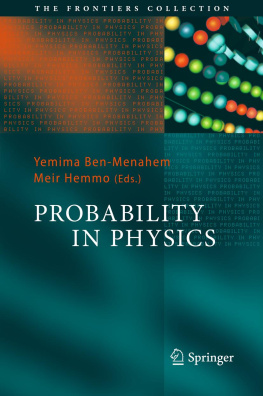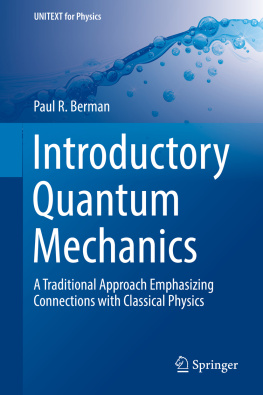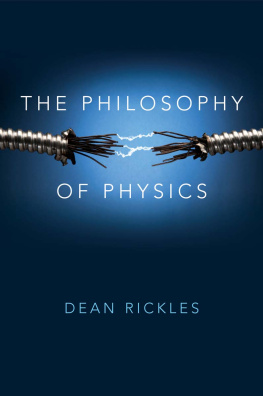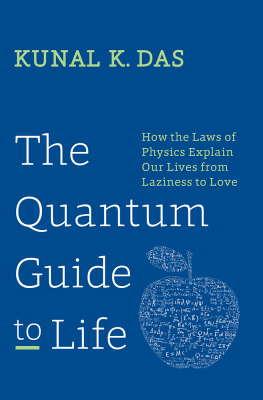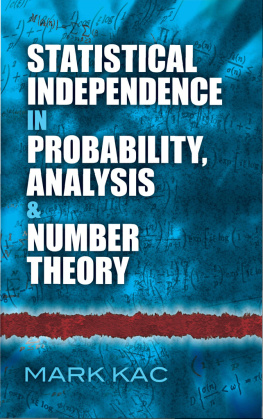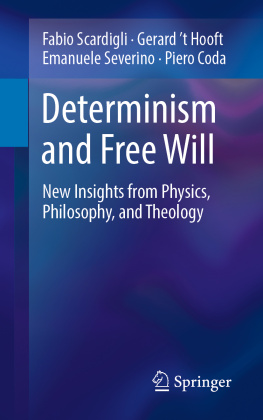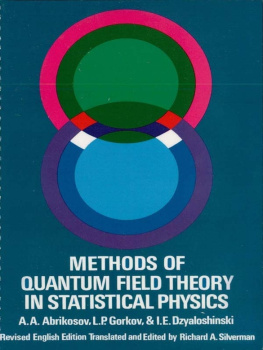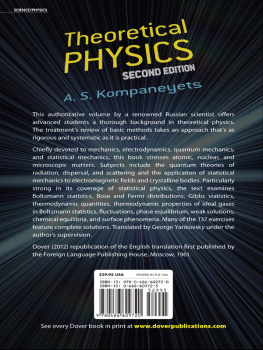Yemima Ben-Menahem and Meir Hemmo (eds.) The Frontiers Collection Probability in Physics 10.1007/978-3-642-21329-8_1 Springer-Verlag Berlin Heidelberg 2012
1. Introduction
Abstract
Questions concerning the meaning of probability and its applications in physics are notoriously subtle. In the philosophy of the exact sciences, the conceptual analysis of the foundations of a theory often lags behind the discovery of the mathematical results that form its basis. The theory of probability is no exception. Although Kolmogorovs axiomatization of the theory [1] is generally considered definitive, the meaning of the notion of probability remains a matter of controversy.1 Questions pertain both to gaps between the formalism and the intuitive notions of probability and to the inter-relationships between the intuitive notions. Further, although each of the interpretations of the notion of probability is usually intended to be adequate throughout, independently of context, the various applications of the theory of probability pull in different interpretative directions: some applications, say in decision theory, are amenable to a subjective interpretation of probability as representing an agents degree of belief, while others, say in genetics, call upon an objective notion of probability that characterizes certain biological phenomena. In this volume we focus on the role of probability in physics. We have the dual goal and challenge of bringing the analysis of the notion of probability to bear on the meaning of the physical theories that employ it, and of using the prism of physics to study the notion of probability.
We thank Orly Shenker for comments on an earlier draft.
Questions concerning the meaning of probability and its applications in physics are notoriously subtle. In the philosophy of the exact sciences, the conceptual analysis of the foundations of a theory often lags behind the discovery of the mathematical results that form its basis. The theory of probability is no exception. Although Kolmogorovs axiomatization of the theory [ Questions pertain both to gaps between the formalism and the intuitive notions of probability and to the inter-relationships between the intuitive notions. Further, although each of the interpretations of the notion of probability is usually intended to be adequate throughout, independently of context, the various applications of the theory of probability pull in different interpretative directions: some applications, say in decision theory, are amenable to a subjective interpretation of probability as representing an agents degree of belief, while others, say in genetics, call upon an objective notion of probability that characterizes certain biological phenomena. In this volume we focus on the role of probability in physics. We have the dual goal and challenge of bringing the analysis of the notion of probability to bear on the meaning of the physical theories that employ it, and of using the prism of physics to study the notion of probability.
The concept of probability is indispensable in contemporary physics. On the micro-level, quantum mechanics, at least in its standard interpretation, describes the behavior of elementary particles such as the decay of radioactive atoms, the interaction of light with matter and of electrons with magnetic fields, by employing probabilistic laws as its first principles. On the macro-level, statistical mechanics appeals to probabilities in its account of thermodynamic behavior, in particular the approach to equilibrium and the second law of thermodynamics. These two entries of probability into modern physics are quite distinct. In standard quantum mechanics, probabilistic laws are taken to replace classical mechanics and classical electrodynamics. Quantum probabilities are here understood as reflecting genuine stochastic behavior, ungoverned by deterministic laws. By contrast, in classical statistical mechanics, probabilistic laws are supplementary to the underlying deterministic mechanics, or perhaps even reducible to it. These probabilities may therefore be the understood as reflecting our ignorance about the details of the microstates of the world or as a byproduct of our coarse-grained descriptions of these states.
Despite this radical difference, the probabilistic laws in both theories pertain to the behavior of real physical systems. When quantum mechanics ascribes a certain probability to the decay of a radium atom, it must be saying something about the atom, not only about our beliefs, expectations or knowledge regarding the atom. Likewise, when classical statistical mechanics ascribes a high probability to the spreading of a gas throughout the volume accessible to it, it is purportedly saying something about the gas, not only about our subjective beliefs about the gas. In this sense the probabilistic laws in both quantum and statistical mechanics are supposed to have some genuine objective content. What this objective content is, however, and how it is related to epistemic notions such as ignorance, rational belief and the accuracy of our descriptions are open issues, hotly debated in the literature, and reverberating through this volume. Before getting into these issues in the physical context, let us briefly review some of the general problems confronting the interpretation of probability.
1.1 The Notion of Probability
Consider the paradigmatic example of a game of chance, a flip of a coin in which in each flip there is a fixed probability of 1/2 for getting tails and 1/2 for getting heads. How are we to understand the term probability in this context? At least three distinct answers can be found in the literature. First, we could be referring to the objective chance for getting heads or tails in each flip. This objective chance is supposed to pertain to the coin, or the flip, or both, or, more generally, to the set up of the coin flip. On this understanding, the chance is a kind of property, a tendency (propensity) of the set up, analogous to other tendencies of physical systems. The analogy suggests that, just as fragility is a tendency to break, chance is the tendency to The problem in completing this sentence is that fragile objects sometimes in fact break whereas a chance 1/2 coin always lands on one of its faces. In other words, a single outcome never instantiates the chance in the way a broken glass instantiates fragility.
The response to this problem leads to the second notion of probability according to which when we say that the probability of tails (heads) in each game is 1/2 we refer to the relative frequency of tails (heads) in a (finite or infinite) series of repeated games. The intuition here is that it is the relative frequency that links the probability of an event to the actual occurrences. While the link cannot be demonstrated in any single event, it is manifest in the long run by a series of events. How does this response affect the notion of chance? We may either conclude that chance has been eliminated in favor of relative frequency, or hold on to the notion of chance along with the caveat that it is instantiated (and thus verified) only by relative frequency. An example of the first kind is the relative frequency analysis by von Mises [], where probability is identified with the infinite limit (when it exists) of the relative frequency along what von Mises called random sequences. Of course, the notion of a random sequence is itself in need of a precise and non-circular characterization. Moreover, the relation between a single case chance and relative frequency is not yet as close as we would like it to be, for any objective chance, say 1/2 for tails, is compatible with any finite sequence of heads and tails, no matter how long it is.

